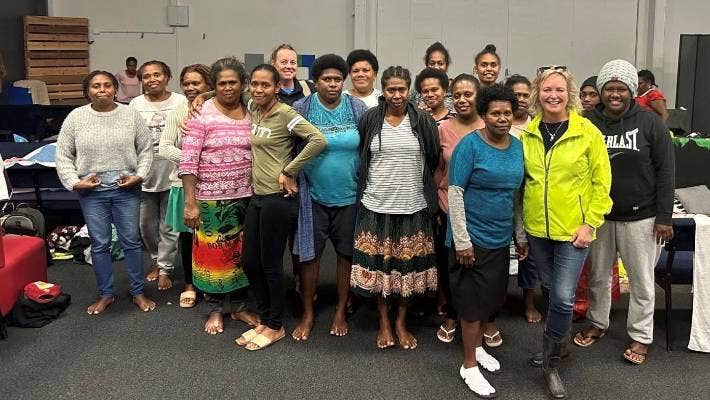Cyclone Gabrielle: Displaced seasonal workers helping rebuild community
Tuesday 21 February 2023 | Written by Supplied | Published in New Zealand, Regional

Anna Lorck, second right, from All 4 Tukituki with ni-Vanuatu women and other RSE workers stranded in Flaxmere. 23022002
A group of Pacific seasonal workers who “lost everything” during Cyclone Gabrielle say they are determined not to let the ordeal get the better of them. Christine Rovoi of Stuff reports.
The group is among 500 displaced Recognised Seasonal Employer (RSE) scheme workers, with 300 of them based in Hawke’s Bay and Tairāwhiti.
Fijian RSE liaison officer in Napier, Filipe Naikausa, told Stuff the workers are now engaged in helping rebuild their communities.
As of February 15, 2023, there are 8226 seasonal workers in the country, Immigration New Zealand Te Ratonga Manene says.
Clean-up efforts are under way in the northern Hawke's Bay town of Wairoa, which still remains largely cut off with limited communication.

Sione Manu, from Apia in Western Samoa, has been working on a farm in Hastings since he arrived in Aotearoa in 2021.
He said the events of Tuesday, February 14, 2023 will forever be etched in his memory.
“At 4.15pm that day, we got an emergency notice on our phones to evacuate to higher grounds as the river had burst its bank and our roads started getting flooded,” Manu said.
“We managed to escape unhurt with only the clothes on our backs. Lucky our experience from living through numerous cyclones in the Pacific helped us overcome the fear as the waters continued to rise around us. It was unbelievably fast.
“I feel for the families who have lost their loved ones. Times like this, we miss our families back home and we wonder if all this is worth it.”
Manu said the sacrifices he and thousands of other RSE workers made must mean something. Manu has joined hundreds of colleagues in the clean-up around Hastings and Napier.
“Wherever we are needed, we will assist.”
Naikausa said RSE workers have been helping out on the ground, “clearing debris, checking homes if there are still people inside and helping with searches for those unaccounted for.
“Even during the storm, those workers who were able to in Napier and Hastings were helping the elderly people and neighbours who needed assistance in evacuating their houses when the floodwaters started pouring in from the nearby river that broke its banks,” he said.
“These workers have lost everything and their future looks bleak with much of their workplaces – the farms destroyed. It’s their resilience in the face of adversity and their humbleness that are most admirable.”
Tevita Lata supervises a group of 50 Tongan fruit pickers at Mr Apple in Hawke’s Bay.
He said on February 14 the men, who earn $22.10 an hour, grabbed what belongings they could in black rubbish bags and took to the roof to escape the rising floodwaters. The group was rescued six hours later.
They took refuge at the Kings House Church in Napier, joining more than 250 other RSE workers singing in the darkness after Cyclone Gabrielle destroyed their homes.
Pastor Nancy Faletutulu said it was a great way to bring comfort and hope to the men who are thousands of miles from their families in the Pacific.
“Our RSE workers begin work next week and will gradually transition to permanent accommodation later,” she said.
“We are a family and the Cyclone Gabrielle brings us all together. Even though many have lost belongings – their faith in God and the support of churches, communities, local businesses and the love and fellowship of one another heals much.
“We were also blessed to finally have a transformer on in the early hours of the morning – torches, candles and generators – just like in the islands. Some areas of Napier now have power. We thank everyone for your prayers.”
Other RSE workers, who are staying at the Flaxmere Samoan Assembly of God church, are also helping communities there, Naikausa said.
Tongan community leader Pakilau Manase Lua said the Aotearoa Tonga Response Group is visiting the workers in Napier.
Vanuatu and Fijian government officials in Aotearoa have been visiting their nationals in affected areas.
Filipe Kuruvoli lives in Taradale, which is in between Napier and Hastings, and he said the community has been touched by the efforts of the displaced seasonal workers to help others in the community, “given they have lost everything”.
Kuruvoli had to flee to family in Onekawa, another Napier suburb, during the storm. There, with the help of other members of the community and RSE workers, they set up a mini evacuation centre for families who could not return to their homes.
“We had cooking utensils, gas burners and barbecues going to help feed our small close-knit Fijian community and neighbours here who were not prepared for the power outage and didn’t have gas burner stoves to cook on,” he told Stuff.
“Some of our RSE workers whose accommodation got flooded had to move to the Te Aranga Marae which is now an evacuation centre.
“The workers have not let the ordeal get to them. Instead, they are helping their communities rebuild, and we thank God that they are all safe.”
Kuruvoli said many of the RSE workers had already experienced cyclones in their Pacific nations.
“They had stocked up on emergency supplies, torches, tinned food, water bottles and tank, power bank to charge phones to keep in touch and communication clearing drains around the houses.”












































